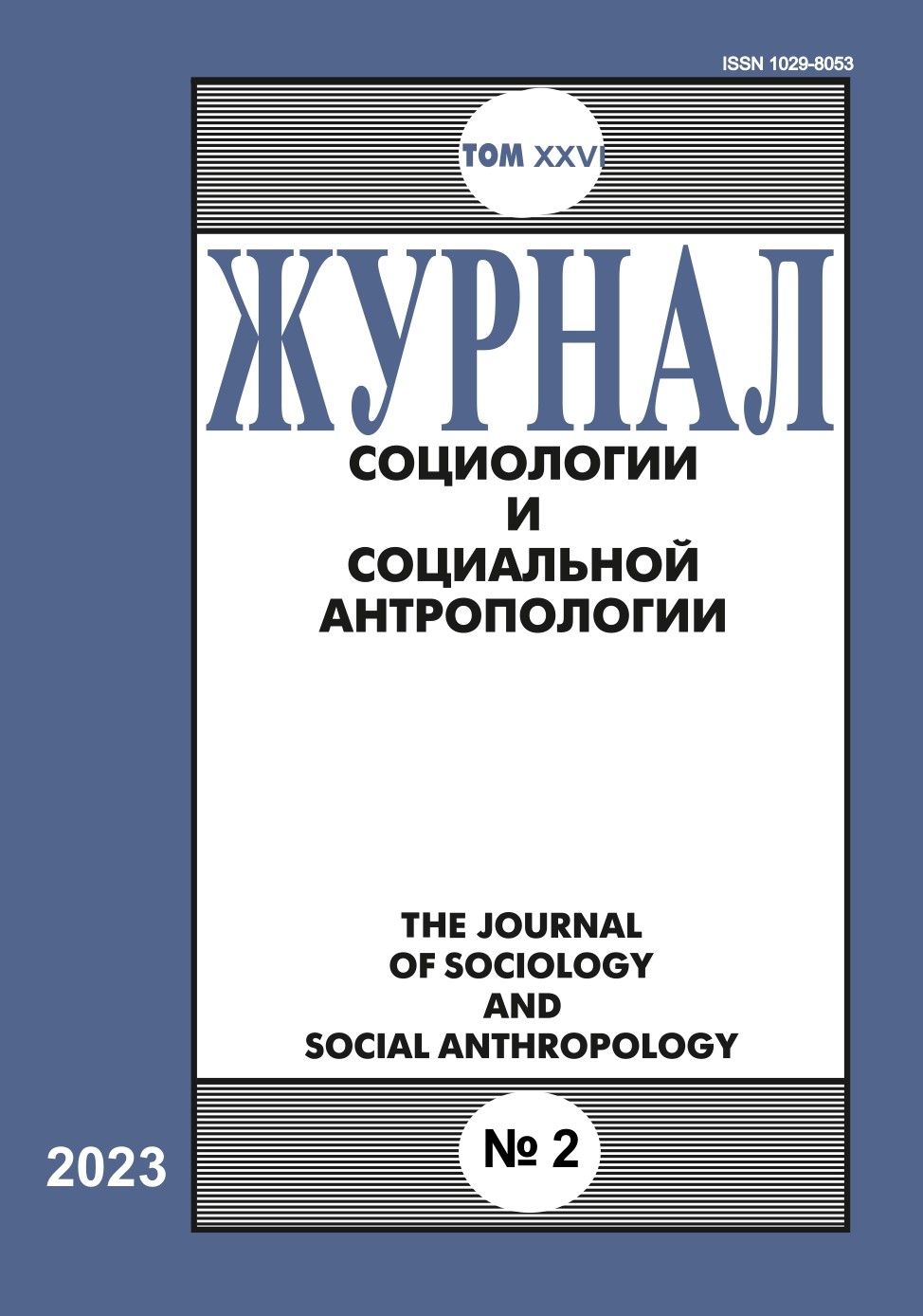Доступность дополнительных занятий и их влияние на развитие детей дошкольного возраста
Аннотация
Литература
Бурдяк А.Я. (2015) Дополнительные занятия по школьным предметам: мотива-ция и распространенность. Мониторинг общественного мнения: экономические и соци-альные перемены, 125(2): 96–112. https://doi.org/10.14515/monitoring.2015.2.08.
Глозман Ж.М., Павлов А.Е. (2007) Влияние занятий музыкой на развитие про-странственных и кинетических функций у детей младшего школьного возраста. Психоло-гическая наука и образование, 12(3): 36–46.
Грицина О.П., Транковская Л.В., Переломова О.В., Тарасенко Г.А., Анищенко Е.Б. (2020) Характеристика условий пребывания и состояние здоровья детей, посещаю-щих организации дополнительного образования. Экология человека, 3: 16–22. https://doi.org/10.33396/1728-0869-2020-3-16-22.
Грицина О.П., Транковская Л.В., Семанив Е.В., Переломова О.В., Щепин-ская Н.Л. (2015) Влияние занятий в организациях дополнительного образования на физи-ческую работоспособность и функциональные показатели детей. Здоровье. Медицинская экология. Наука, 62(4): 74–78.
Гришина Е.Е., Цацура Е.А. (2022) Семьи с детьми от 3 до 7 лет в период пан-демии COVID-19: оценка материального положения и охвата поддержкой. Народонасе-ление, 25(1): 55–64. https://doi.org/10.19181/population.2022.25.1.5.
Заякина О.А. (2021) Социально-экономическое самочувствие российских се-мей с детьми в условиях пандемии коронавирусной инфекции. Власть, 29(3): 209–212. https://doi.org/10.31171/vlast.v29i3.8182.
Корчагина И.И., Прокофьева Л.М. (2021) Социальная поддержка семей с деть-ми в период эпидемии короновируса и реальная нуждаемость семей. Народонаселение, 24(4): 95–106. https://doi.org/10.19181/population.2021.24.4.8.
Костина С.Н., Новикова О.Н. (2021) Цифровое неравенство школьников в условиях дистанционного обучения: кейс Пермского края. Вестник Южно-Уральского государственного университета. Серия: Социально-гуманитарные науки, 21(3): 77–86. https://doi.org/10.14529/ssh210310.
Куприянов Б.В. (2015) Детские досуговые занятия двух поколений россиян (по результатам социологических исследований). Социологические исследования, 379(11): 156–160.
Леонидова Г.В., Валиахметов Р.М., Баймурзина Г.Р., Бабич Л.В. (2020) Про-блемы и перспективы дистанционного обучения в оценках учителей и родителей обуча-ющихся. Экономические и социальные перемены: факты, тенденции, прогноз, 13(4): 202–219. https://doi.org/10.15838/esc.2020.4.70.12.
Майорова-Щеглова С.Н. (2016) О перспективах изучения досуговых занятий современных детей (в ответ на статью Б.В. Куприянова). Социологические исследования, 392(12): 135–138.
Мустафаева С.А. (2020) Взаимодействие учителей начальных классов с семья-ми учащихся в условиях дистанционного обучения. Мир науки, культуры, образования, 85(6): 218–221. https://doi.org/10.24412/1991-5500-2020-685-218-221.
Образцов И.В., Половнев А.В. (2022) Вовлеченность школьников в дополни-тельное образование и занятия иностранным языком. Социологические исследования, 6: 101–113. https://doi.org/10.31857/S013216250016400-3.
Пермякова М.Е., Ткаченко Е.С. (2016) Влияние занятий музыкой на когнитив-ное развитие детей младшего школьного возраста. Образование и наука, 133(4): 155–170. https://doi.org/10.17853/1994-5639-2016-4-155-170.
Пунгина А.П., Зайнаготдинова А.О., Сенникова М.А., Авдеева В.П., Одино-кова В.А., Русакова М.М. (2022) «Чтобы не болтался»: внешкольная деятельность как мера профилактики девиантного поведения детей. Журнал социологии и социальной антропо-логии, 25(1): 132–167. https://doi.org/10.31119/jssa.2022.25.1.5.
Стурова Е.В. Степанова И.C., Смирнова А.A. (2021) Физическое воспитание детей от рождения до 7 лет и его влияние на здоровье. Здоровье человека, теория и мето-дика физической культуры и спорта, 24(4): 36–47. https://doi.org/10.14258/zosh(2021)4.03.
Христочевский С.А. (2021) Проблемы массового дистанционного обучения в условиях пандемии. Информатика и образование, 323(4): 4–11. https://doi.org/10.32517/0234-0453-2021-36-4-4-11.
Цинченко Г.М., Орлова И.С. (2022) Государственная поддержка семей с деть-ми в период пандемии COVID-19 в России и за рубежом. Управленческое консультиро-вание, 162(6): 161–168. https://doi.org/10.22394/1726-1139-2022-6-161-168.
Шматова Ю. Е. (2021) Психологическое состояние жителей Вологодской обла-сти в период пандемии COVID-19. Социальное пространство, 7(3). https://doi.org/10.15838/sa.2021.3.30.2.
Chen H.C. (2016) The Impact of Children’s Physical Fitness on Peer Relations and Self-Esteem in School Settings. Child Indicators Research, 9, 565–580. https://doi.org/10.1007/s12187-015-9330-6.
Gracia P., Garcia-Roman J., Oinas T., Anttila T. (2022) Gender differences in child and adolescent daily activities: A cross-national time use study. Acta Sociologica, 65(1), 41–65. https://doi.org/10.1177/00016993211008500.
Lee A.H.I., Yang C.N., Lin C.Y. (2012) Evaluation of children’s after-school pro-grams in Taiwan: FAHP approach. Asia Pacific Education Review, 13: 347–357. https://doi.org/10.1007/s12564-011-9202-9.
Mason M.J., Chuang S. (2001) Culturally-Based After-School Arts Programming for Low-Income Urban Children: Adaptive and Preventive Effects. The Journal of Primary Preven-tion, 22: 45–54. https://doi.org/10.1023/A:1011088114411.
Rees G. (2017) Children's activities and time use: Variations between and within 16 countries, Children and Youth Services Review, (80): 78–87. https://doi.org/10.1016/j.childyouth.2017.06.057.
Riggs N.R., Greenberg M.T. (2004) After-School Youth Development Programs: A Developmental-Ecological Model of Current Research. Clinical Child and Family Psychology Review, 7: 177–190. https://doi.org/10.1023/B:CCFP.0000045126.83678.75.
Sauerwein M. N., Rees G., (2020) How children spend their out-of-school time — A comparative view across 14 countries, Children and Youth Services Review, 112, 104935. https://doi.org/10.1016/j.childyouth.2020.104935.
Savahl S., Adams S., Florence M. et al. (2020) The Relation Between children’s Par-ticipation in Daily Activities, Their Engagement with Family and Friends, and Subjective Well-Being. Child Indicators Research, 13: 1283–1312. https://doi.org/10.1007/s12187-019-09699-3.
Поступила: 15.11.2022
Опубликована: 02.07.2023






